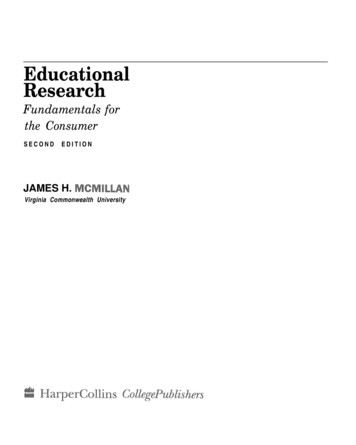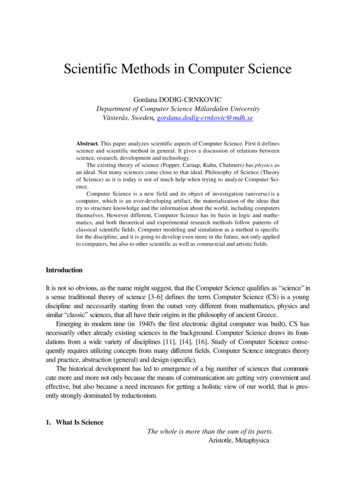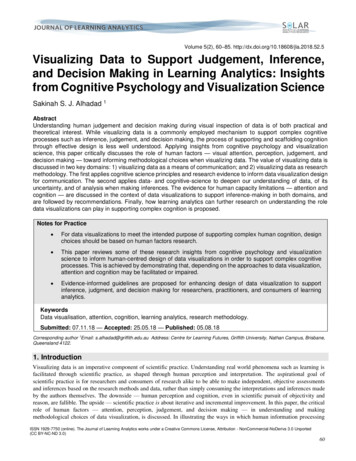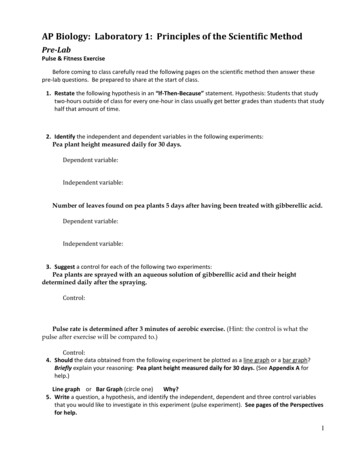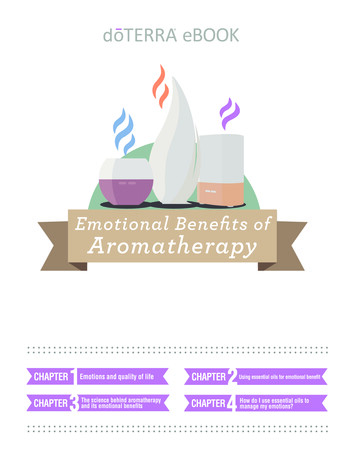
Transcription
112233CHAPTER Emotions and quality of lifeCHAPTER Emotions and quality of lifeCHAPTER Using essential oils for emotional benefitCHAPTERUsing essential oils for emotional benefitand its emotional benefitsCHAPTER The science behind aromatherapyCHAPTERCHAPTER Emotions and quality of lifeCHAPTER Using essential oils for emotional benefitCHAPTERUsing essential oils for emotional benefitCHAPTER The science behind aromatherapyCHAPTER The science behind aromatherapyCHAPTER112233CHAPTER Emotions and quality of lifeand its emotional benefitsCHAPTER The science behind aromatherapyand its emotional benefitsCHAPTER How do I use essential oils to managemy emotions?and its emotional benefitsHow do I use essential oils to managemy emotions?How do I use essential oils to managemy emotions?1CHAPTER 2CHAPTER 1CHAPTERCHAPTER 32CHAPTERCHAPTER 43CHAPTEREmotions and quality of lifeUsing essential oils for emotional benefitEmotions and quality of lifeThe science behind ils foremotional benefitHow do I use essential oils toThesciencebehind aromatherapymanagemy emotions?and its emotional benefitsCHAPTER How do I use essential oils to managemy emotions?CHAPTER Emotions and quality of life1CHAPTER 2CHAPTER 1CHAPTER 3CHAPTER 2CHAPTER 4CHAPTER 3Using essential oils for emotional benefitEmotions and quality of lifeCHAPTER4The science behind ils foremotional benefitHow do I use essential oils toThesciencebehind aromatherapymanagemy emotions?and its emotional benefitsHow do I use essential oils tomanage my emotions?
123CHAPTEREmotions and quality of lifeNo matter our age, lifestyle, or geographic location, one thing that all humans have incommon is that we all experience emotions every day. Emotions are an inescapable part ofCHAPTERbeing a human, and they have a serious impact on our happiness and wellbeing. AlthoughUsing essential oils for emotional benefitemotions are somewhat mysterious, they can be characterized as complex internalreactions that will differ from person to person.Because we each have a unique personality and a unique set of personal experiences, each of us willexperience emotions in different ways. We each have different methods for responding to and coping withCHAPTERThe science behind aromatherapyitsbenefitsWhile our emotions can affect our andquality oflife inemotionalseveral ways, we knowthat they are very influential inemotions, and each person displays their emotions a little differently.shaping our motivations—which can then shape our behavior and way of thinking. Our responses to emotionscan have negative or positive effects on our qualityof life, depending on how we choose to respondbased on our personality or experiences. While eachperson experiences emotions differently, uncheckedemotions can seriously affect anyone’s quality ofCHAPTERby impacting theiroilsemotionalphysical health.How do I uselifeessentialtoormanageConversely, experiencing positive emotions andmy emotions?finding healthy ways to deal with negative emotionscan lead to an improved quality of life. Whetherwe choose to deal with our emotions, or leavethem unchecked, we will never be able to escape15 mLMenthapiperitaPeppermintCHAPTER1emotions entirely.Emotions and quality of life
A scientific look at emotionsvital role they play in our daily lives. Most scientists15 mL15 mLCitruslimonemotions because of their mysterious nature and theagree that emotions are complex, multi-factorialMenthaspicataSpearmintLemon15 mLFor decades, scientists have studied human15 mLMetabolicBlendCanangaodorataYlang YlangSlim & Sassy responses that are triggered by multiple mechanismsand stimuli. This explains why emotions are socomplex and mysterious—they are multi-factorial,which means that they are dependent on a varietyof factors or causes. Emotions are also complicatedbecause they can be triggered by any number ofmeans or stimuli.Simply put, emotions are your response to theenvironment around you. This “environment”includes your physical location, the people around you, any activities you are engaging in, and dozens of otherfactors (both in and out of your control.) Your brain will process these factors and determine how to respondemotionally. This response will usually lead to some sort of action, and is typically based on your previousexperiences and survival instincts.As mentioned, emotions and responses will vary from person to person because of our unique personalitiesand life experiences. An individual’s personality and experience will influence how they perceive stimuli andtheir environment. This is why we each have unique responses and ways of dealing with emotions—the samestimuli can be perceived differently by two people.While there are a wide array of emotions, and countless possible responses, emotions can generally becategorized into one of two categories: positive or negative. As mentioned, positive emotions can help improvewellbeing and quality of life, while negative emotions can take a toll on the body, both mentally and physicallywhen they are not dealt with properly.Scientific definition of emotions: complex, multi-factorial responses that are triggered by multiplemechanisms and stimuli.Multi-factorial: dependent on a number of factors or causesMechanisms: devices, means, or methodsStimuli: something that stimulates or acts as an incentive, or creates a response
Negative emotionsAny emotion that we might feel throughout the day can typically be categorized as either a positive emotionor a negative emotion. Positive emotions uplift our mood and usually motivate us to act in a way that will helpus maintain that positive mood. Negative emotions can also motivate us to act in a way that will uplift ourmood; however, if these negative emotions are left unchecked, they can have serious effects on overall health,especially emotional health. As discussed, negative emotions can impact our quality of life, and even alter howour body feels and functions.Handling negative emotionsTo keep negative emotions from decreasing yourquality of life, it is important to have healthy copingmechanisms. Because emotions vary from person toperson, it should come as no surprise that methodsfor handling emotions will also vary depending onyour personality, preferences, and other factors. Forexample, some people find physical activity andexercise to be an effective way to deal with negativeemotions, while others prefer quiet reflection ormeditation. Any number of activities (or a combinationof several activities) can work to help an individual dealwith their negative emotions.When it comes to handling negative emotions, itis important to find a method that works for youpersonally. Consider engaging in a favorite hobby orpastime, confiding in a friend or loved one that youtrust, practicing meditation or simply setting aside quiettime for relaxing. Finding an activity that you enjoy andthat will help you work through any negative feelings isa healthy part of dealing with emotions.Using aromatherapy to dealwith negative emotionsIn addition to developing healthy habits for dealing with negative emotions, you might also considerincorporating the use of essential oils into your regular routine for mood management. Although methodsfor dealing with negative emotions will vary from person to person, there is a wide variety of essential oilsto choose from when it comes to uplifting mood and promoting positive emotions. Because each person isunique, it is helpful to have an equally unique set of oils, each with its own unique chemistry, to help soothe,calm, or uplift the mood. Once you learn about how to use essential oils to manage your mood, you will findthat they can become a regular part of your routine for combating negative emotions in your daily life.
123CHAPTERUsing essential oils for emotional benefitUsed anciently for their ability to influence emotions, essential oils are still useful today formanaging mood and promoting uplifting feelings. Those who don’t know about the rich historyof essential oils and aromatherapy might assume that using essential oils for emotions (andCHAPTERThe science behind aromatherapyandits ancientemotionalbenefitsaromatherapy has continued togrow sincetimes as essentialoils have constantly provenother purposes) is merely a new trend or fad that will soon pass. However, the popularity ofan effective method for managing emotions. In addition to historic examples of aromatherapy,more recent research and scientific findings have also helped to prove the success of essentialoils for managing mood.CHAPTERHow do I use essential oils to manageHistory of aromatherapymy emotions?Early usageAlthough it was not always referred to as aromatherapy,the use of essential oils for emotional benefit dates backto ancient times. People in ancient civilizations often1CHAPTER 2used essential oils, plants, and other plant materials forthings like cooking, bathing, promoting healthy skin, andCHAPTEREmotions and quality of lifea variety of healthcare practices. In addition to thesepractical daily uses, essential oils were frequently usedduring burials, rituals, and religious ceremonies, as manyancient cultures recognized the power of essential oilson emotions.Aromatherapy was used in ancient civilizations likeUsing essential oils for emotional benefitGreece, Rome, China, and India—usually duringmeaningful events like religious ceremonies and otherrituals. For example, Babylonians and Assyrians wouldCHAPTERThe science behind aromatherapy
burn Frankincense during religious ceremonies due to its warm aroma that promotes feelings of peace andrelaxation. In ancient Rome, soldiers would use Fennel before going into battle to help make themfeel strong and brave.While the idea of aromatherapy has developed and changed since ancient times, it is clear that the people ofthese ancient cultures recognized the power in using essential oils to influence emotions.Aromatherapy in the 20th CenturyEven though the practice of aromatherapy dates back toancient times, it was not until the 20th century that the term“aromatherapy” was officially coined and scientists began tosupport the idea of using essential oils for emotional benefit.While many have enjoyed the benefits of aromatherapy forhundreds of years, it wasn’t until the 1990s that scientistswere able to prove the connection between essential oils andmood management.In the early 1990s, substantial research helped biologistsbetter understand how the brain reacts to aromas. Thisresearch proved what people of ancient civilizations hadalready put into practice—essential oils can be used tocreate responses within the body, particularly to benefit andinfluence emotions. Although the science of emotions stillholds significant mystery, we know that there is a connectionbetween scent and emotions. Because of this connection,we also know that aromatherapy is a useful tool for managingemotions and uplifting mood.Why use essential oils to manage mood?As mentioned, each person experiences emotions a little differently, and thus, the methods for managingemotions will vary from person to person. While there are many options available for uplifting mood andcoping with negative emotions, there are several benefits to using aromatherapy and essential oils to manageemotions.A safe, natural way to manage moodDepending on the individual and the emotion, there are seemingly endless methods for altering ormanaging mood. However, many of these options do not promote good emotional health or physical health.Unfortunately, some people use questionable or even potentially dangerous methods to manage or alter theiremotions, which can lead to more serious problems down the road.The benefit of using essential oils for mood management is that they can help soothe, calm, and uplift theemotions in a natural way. High quality essential oils are pure and potent, so only a little oil will be needed
to help the user achieve the desired effect. Although essential oils are extremely powerful, they comefrom natural sources, so they are still safe to use. By providing a safe, natural way to manage emotions,aromatherapy is a good alternative to many of the other mood management tactics out there.Essential oils generate quickresponsesAs discussed, high quality essential oils are extremelypowerful and potent. Typically, you will start experiencingsome sort of response from the moment you open thebottle, because you will be able to smell the oil from adistance. This power and potency means that you willonly have to use a small amount of oil to help manageyour mood. While some methods for managing emotionscan be ineffective, essential oils will generate natural,effective responses. By using aromatherapy for emotionalbenefits, you can harness the power of essential oils to15 mL15 mLLavandulaangustifoliaLavenderoptions available for uplifting mood and coping withCitruslimonwill vary from person to person. While there are manyLemondifferently, and thus, the methods for managing emotions15 mLAs mentioned, each person experiences emotionsMenthapiperitaemotions you experience on a daily basis.Pepperminthelp you quickly and effectively deal with the variety ofnegative emotions, there are several benefits to usingaromatherapy and essential oils to manage emotions.Essential oils provide a simple method that can be used inconjunction with other tacticsOne reason that aromatherapy has been a popular method for managing mood throughout history lies in itssimplicity. You don’t need to be a professional in aromatherapy or a scientist to enjoy the emotional benefitsof essential oils. Once you learn a little bit about essential oils and how they work, you can easily use them in.your daily life to help manage your mood. After you learn the proper methods for applying essential oils, andunderstand which essential oils possess calming, uplifting, invigorating, relaxing, or other properties, it will beextremely easy to enjoy the emotional benefits of aromatherapy.Not only are essential oils easy to use and apply, but they can be used in conjunction with other moodmanagement methods to help you keep your emotions in check. Essential oils are often used with methodslike massage or meditation, and even in conjunction with activities like exercise, bathing, or sleeping. Thismakes it easy to tailor essential oils and aromatherapy to your personal preferences—further helping youcope with negative emotions during your day-to-day routine.
3CHAPTERThe science behind aromatherapyand its emotional benefitsWhile aromatherapy has proven an effective method for influencing emotions throughout severalcenturies, the connection between the brain and aroma is more than an ancient practice—it canCHAPTERnow be explained scientifically due to extensive research and discovery. The science behindHow do I use essential oils to managemyaromatherapy helps to explainhowemotions?it is possible for different aromas to elicit certain feelings.As we learn about the scientific background of aromatherapy, we can better understand howessential oils are used to manage the emotions and influence mood.1CHAPTER 2CHAPTER 3CHAPTER 4CHAPTERHow does the brainprocess aromas?Emotions and quality of lifeAnytime we inhale a distinct aroma (including thescent of an essential oil), that aroma will be processedthrough different parts of the brain in a specialUsing essential oils for emotional benefitsequence. After inhaling an aroma, the scent will beprocessed in the brain’s olfactory system, which isresponsible for controlling our sense of smell. Whenan aroma is inhaled, it travels to the olfactory systemby way of the olfactory nerve, so that it can beThe science behind aromatherapyand its emotional benefitsprocessed. The olfactory system is connected to thelimbic system, a part of the brain where our emotionsand memories are stored. This connection to thelimbic system causes a response to the aroma basedon any memories that are associated with that smell.The response produced by the limbic system of thebrain often causes an immediate rush of feelings—also known as an emotional response.How do I use essential oils tomanage my emotions?
An aroma is inhaled and travels to the olfactory system, which is responsible forcontrolling our sense of smell. The olfactory system is connected to the limbic system,where our memories and emotions live. The limbic system then produces a response.Because our sense of smell is so closely connected to the part of our brain that stores memories andemotions, it is easy to see why specific aromas elicit specific emotions or feelings. The idea behind usingaromatherapy for emotional benefit is that the userchooses certain essential oils to trigger desired feelingsand emotions, particularly when aiming to combat ordispel negative emotions.Understanding the special chemistry behind eachessential oil makes it easy to target emotions andmanage our mood, because it allows us to produce aspecific response within the brain.Chemical responsesAs mentioned, certain aromas can elicit certain emotionsby triggering our memories and creating emotionalresponses. While everyone has different memories andlife experiences, it is possible to harness the powerof essential oils to create a specific response. Eachessential oil has a unique chemical profile, which givesthe oil certain properties and benefits. The chemicalmakeup of the essential oil will determine its attributes,benefits, and what kind of emotional responses it canproduce. Therefore, it is possible to choose an essentialoil based on its chemical profile for the purpose ofeliciting a specific emotional response.While there are many elements involved in the chemicalmakeup of an essential oil, many of the chemicalconstituents included in an oil depend on what kind ofplant it comes from. Most essential oils come from plants,fruits, or plant materials, which will determine what kindof chemical constituents are included in the oil once itis produced. For a closer look at how the plant sourceand chemical profile of an essential oil can determine itsbenefits, take a look at the plant categories below.
MINT: With a high concentration of ketones, mint essential oils typically hold significantenergizing, invigorating, and uplifting properties.FLORAL: Composed mostly of monoterpene alcohols and esters, floral essential oils areknown to promote toning and calming properties.CITRUS: Using the monoterpenes known as limonene and beta-pinene, citrus essential oilstypically have strong uplifting characteristics.TREE, GRASS, HERB: Rich in esters, oxides, and sesquiterpenes, essential oils taken fromtrees, herbs, and grasses promote soothing, renewing, and grounding feelings.SPICE: Phenols are the primary chemical constituents of most spice essential oils, makingthese oils particularly useful for their warming properties.Calming and uplifting propertiesWhile each essential oil has its own unique chemical makeup, every essential oil can be divided into oneof two categories based on its chemical constituents—uplifting or calming. This is what makes essentialoils so useful for managing negative emotions. When you lack motivation, enthusiasm, or inspiration, youcan use essential oils with an uplifting chemical profile to help lift you out of a funk. When you feel frazzled,overwhelmed, or down, you can use calming oils to helppromote soothing, grounding, or renewed emotions.Calming oilsEssential oils that fall into the calming category typicallycontain monoterpene alcohols, sesquiterpenes, esters,and oxides. Here are a few examples of calming oilsthat can be used to promote soothing, grounding, orrejuvenating emotions:Clary SageEucalyptusFrankincenseGeraniumJasmineJuniper BerryLavenderRoman ChamomileYlang Ylang
Uplifting oilsPrimarily composed of ketones, phenols, andmonoterpenes like beta-pinene and limonene,uplifting essential oils can be used to promoteenergizing, invigorating, warming, or elevatingemotions. The following are examples of essentialoils in the uplifting category:CypressDouglas FirGrapefruitLemonLimePeppermintWhite FirWild OrangeCreating a personalized experienceThe beauty of aromatherapy is that it allows the user to apply particular oils in order to produce certainemotional responses and manage their mood. However, no two people are the same, and because aromasare processed in the limbic system where our memories and emotions are stored, it is possible for two peopleto have a different reaction to the scent of the same oil. While a chosen essential oil can elicit a specificresponse, it is important to remember that our reaction to an aroma will be based on our experiences,preferences, environment, and even our unique genetic makeup.This is perhaps why aromatherapy has been in practice for so long—the user can create an individualizedaromatic experience based on their unique experiences and preferences. No two people will have exactlythe same response to a single oil, which makes aromatherapy a highly individualized method for dealingwith emotions. Your personal experiences, emotions, and preferences will determine how an essential oilbenefits you, which makes it easy to tailor your aromatherapy experience to your specific needs. No matterthe individual or the oil, one thing is for certain—essential oils can be used to generate powerful internalresponses that can help promote wellbeing.
3CHAPTERHow do I use essential oils to managemy emotions?Now that you have a better idea of the scientific principles that make essential oils useful for1CHAPTER 2CHAPTER 3CHAPTER 4influencing emotions, you might be wondering, “How do I use essential oils when I want to manageCHAPTEREmotions and quality of lifemy mood?” The key to successful mood management through aromatherapy is understandingthe benefits that each individual oil has to offer. As discussed, each essential oil has a uniquechemical profile that determines its characteristics and benefits. As you learn about each oil, itsUsing essential oils for emotional benefitchemical makeup, and its benefits for emotions, you will be equipped to select the correct oil (ora combination of several oils) to generate the kind of emotional response you desire.Aromatic applicationThe science behind aromatherapyand its emotional benefitsWhile there are countless ways to apply essentialoils, aromatherapy typically requires the userto inhale the aroma—one way or another. Yes,essential oils can typically be used aromatically,How do I use essential oils tomanage my emotions?topically, or internally, but it is important tonote that aromatic application works bestfor managing mood. Using an essential oil“aromatically” means that the user will inhale thearoma through the air. Whether you inhale the oilstraight from the bottle, rub the oil between yourhands and inhale from your palms, or diffuse theoil in an essential oil diffuser and breathe in thearoma through the air, there are many ways to useoils aromatically for aromatherapy.
Topical applicationKeep in mind that topical use of essential oils is another effective application method for aromatherapybecause it typically allows the user to inhale the aroma during application, and because the scent willremain on the skin for a period of time. Before applying an essential oil to the skin, make sure that the oilhas been approved for topical use. If the oil has a particularly strong chemistry, or if you have sensitiveskin, make sure to dilute the oil with a carrier oil before applying topically. The following essential oilsshould always be diluted before topical use: Cassia, Cinnamon, Clove, Cumin, Oregano, and Thyme.Because there are several ways to enjoy the mood enhancing benefits of essential oils, we will discussmore application ideas for aromatherapy later on in this chapter.Essential oil properties wheelEven after learning about essential oils and their benefits, it can be difficult to remember the specificchemical makeup and emotional benefits of every single oil. Use the essential oil properties wheel belowwhen you want to find an oil with specific emotional benefits.
These wheels list each essential oil, its main chemical constituents, and the key properties or benefits ofthe oil. When you are ready to use essential oils for mood management, there are a few simple steps thatwill help you achieve your desired outcome.1. Determine the type of emotion you want to evoke2. Find an essential oil with the properties that fit the emotional response you want to promote(soothing, uplifting, calming, energizing, etc.)3. Determine the best application method to help you experience the emotional benefits of the oil(diffusion, topical application, massage, etc.)4. Consider blending several essential oils together to experience multiple emotional benefits5. Apply the essential oil using your chosen method, and enjoy the immediate emotionalresponses that follow
The best essential oils for mood managementLearn more about the emotional benefits of specific essential oils by reading the descriptions below.Remember, some essential oils should always be diluted before topical use, including Cassia, Cinnamon,Clove, Cumin, Oregano, and Thyme.Arborvitae: The grounding aroma of Arborvitae oil can help promote a sense of peace and calm.Basil: Diffuse Basil oil to lessen occasional anxious feelings.Bergamot: Both calming and uplifting, Bergamot can be used to reduce feelings of negativity and stress.Cardamom: The clear, refreshing aroma of Cardamom oil can help promote a positive mood.Cedarwood: Use Cedarwood oil aromatically to help relax the mind and body.Clary Sage: Clary Sage creates a restful environment while reducing feelings of stress and anxiousness.Clove: Many people use Clove oil for its stimulating and energizing properties.Coriander: Coriander oil can be used to promote feelings of calmness and relaxation.Cypress: The refreshing aroma of Cypress oil can be energizing and can help reduce anxious feelings.Douglas Fir: Use Douglas Fir oil to promote a positive mood and sense of focus.Eucalyptus: Eucalyptus is commonly used to lessen feelings of tension and promote relaxation.Frankincense: Use Frankincense oil to induce feelings of peace, satisfaction, and overall wellness.Geranium: Inhaling Geranium oil can produce a calming, grounding effect.Grapefruit: The fragrance of Grapefruit oil is light and uplifting for the user.Jasmine: Use Jasmine oil to evoke feelings of peace, joy, and self-confidence.Juniper Berry: When used aromatically, it can promote positive feelings and lessen feelings of stress.Lavender: People commonly use Lavender oil for its relaxing and calming properties.Lemon: Use Lemon oil aromatically to promote a positive mood.Lime: The chemical constituents of Lime oil make it useful for promoting emotional balance and wellbeing.Marjoram: For centuries, Marjoram oil has been used for its calming properties.Melissa: Use Melissa oil to help calm tension and nerves.Myrrh: Myrrh oil can help increase spiritual awareness and promote a creative, inspiring, energetic mood.Patchouli: Aromatic use of Patchouli oil can help ground and balance emotions.Peppermint: Use Peppermint oil for an invigorating energy boost.Petitgrain: The aroma of Petitgrain oil can help ease feelings of tension and promote feelings of calmness.Roman Chamomile: Use Roman Chamomile oil to promote peaceful, calming feelings.Rose: The scent of Rose oil can be emotionally uplifting.Sandalwood: Sandalwood oil can help enhance mood.
Spearmint: The fresh aroma of Spearmint oil uplifts mood while promoting a sense of focus.Spikenard: Frequently used in aromatherapy, Spikenard oil is renowned for its grounding properties.Tangerine: Apply Tangerine oil topically to help promote feelings of happiness.Vetiver: Vetiver oil can have a calming, grounding effect on emotions.White Fir: The invigorating aroma of White Fir oil can promote feelings of energy and empowerment.Wild Orange: With a revitalizing aroma, Wild Orange oil can provide energy on a stress-filled day.Ylang Ylang: Apply Ylang Ylang oil topically for a calming, uplifting effect.Ideas for using essential oils to improve moodOnce you’ve chosen an essential oil that will help you manage your mood, there are countless ways toapply the oil for mood management success. Try a few of the application methods below to enhance yourmood with the power of essential oils.Place a few drops of your chosen oil in an essentialoil diffuser and diffuse in rooms where you wantto promote feelings of peace, energy, or positivity(your bedroom, office, study area, etc.).Apply essential oils to the temples, shoulders, andneck to experience the mood-enhancing benefitsas you inhale the aroma.Use a spray bottle to spritz essential oils over yourclothing and enjoy the aroma throughout the day.Add a few drops of a relaxing, grounding, orsoothing essential oil to a warm bath.Place one to two drops of oil on your hands, rubthe palms together, cup your hands over your nose,and breathe deeply to experience the emotionalbenefits of the oil.Place a few drops of an essential oil on the floorduring your shower (away from the water path),and breathe deeply.Diffuse your essential oil of choice during yourmorning meditation or yoga practice.Apply essential oils topically before physicalactivity to promote energizing, uplifting feelings.Use calming, soothing, and grounding essential oilsduring your next massage to promote relaxationand enhanced emotions.Spritz calming essential oils over your pillows andbedding to help promote peaceful thoughts asyou go to sleep.Rub uplifting essential oils on the bottoms ofthe feet in the morning to promote invigorating,energizing feelings, or rub calming essential oilson the bottoms of the feet before going to bed topromote peace and relaxation.As you can see, aromatherapy is a simple, effective method for managing emotions and enhancing mood.Y
A scientific look at emotions For decades, scientists have studied human emotions because of their mysteriou
